|
|
|
|
|
|
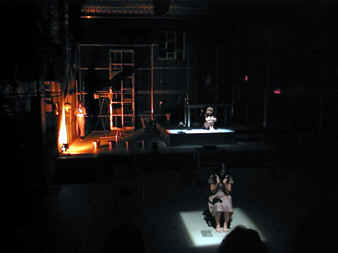 |
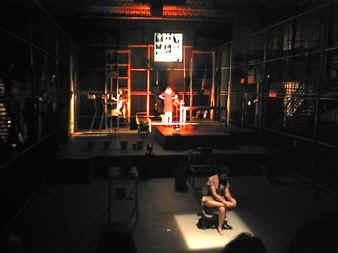 |
|
|
|
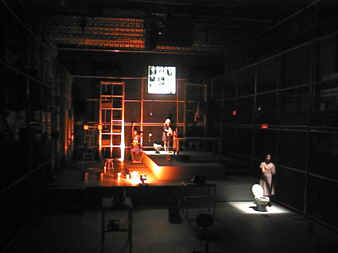 |
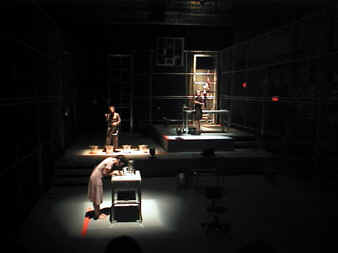 |
|
|
|
|
|
|
|
|
|
rooms
la mama new york march 10, 2000
|
|
|
|
|
|
 |
 |
|
|
|
 |
 |
|
|
|
|
|
|
|
|
|
Writen and Directed by Elia Schneider
Costume and Stage Design by Maitena de Elguezabal
As three women walk in file from a street into their homes in the closing minutes of "Rooms" -- it is a 20-foot stroll that has the majesty of an imperial funeral procession on a grand avenue -- an unspeakable sorrow of hopelessness spreads through the theater like the shadow of death's wings. Yet it is such a triumphant moment of theater that it brings cries of admiration and a thunder of hands from the audience. People seem as puzzled by their reaction as by this play, and the tribute is fitting.
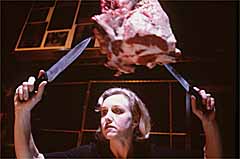 Ricardo Armas/"Rooms" |
Not one of the characters speaks a line to define herself; the only words, recited usually in unison or as fragments of chant, are four brief sentences about logs in snow from a Kafka story. But in the hour they appear onstage the women reveal powerful personalities; longings that are draining life from them; an awareness of one another and of the audience before them that is harrowing to feel; and relentless energy that spends itself on boredom. Yet they are anything but boring.
You want to get inside this story and embrace its inhabitants, but find yourself as locked out as they are locked in.
The play is the invention of Elia Schneider, who also, with infinite cunning, directs the performances at La Mama in a brief run that ends this weekend. Ms. Schneider, artistic director of Teatro Dramma-Caracas, has been creating drama out of ideas harvested from Kafka for 20 years and has presented several of her works at La Mama since 1980. Here, she distills theater almost entirely into form and image, with some striking help from sets by Maitena de Elguezábal (three rooms in shades of gray that make you think of brilliant colors, all boxed by soaring walls of wire mesh) and lighting by Jose Novoa, a filmmaker who makes the rooms shine, brooding boxes Fritz Lang would have loved. Latin American theater often seems to aspire to opera, and the music composed for "Rooms" by Juan Carlos Nuñez sometimes suggests that an anguished soprano might be ready to cry out.
(There are also times when it sounds distracting.)
For actors to create character silently in such surroundings is an extraordinary challenge, met defiantly by Dad Dáger, Bettina Grand and Ricarda Klingenhöfer. Ms. Klingenhöfer's character, a tippler but a grand cook, caresses slabs of beef hanging in her kitchen with erotic attention; occupies her bathroom as if it were a salon; and worries about her health in front of a spectacular room divider of shimmering X-rays. And she alone, of the three, smiles.
Ms. Grand plays the great obsessive, washing and ironing clothes, killing vermin with spray and feet made for kickboxing, sneaking puffs on a cigarette or a glimpse at television, manically mopping, dribbling a basketball, constantly looking at her watch, which shines in her face like a flashlight. And Ms. Dáger is the one who has not lost her intuition. She may clean a table so furiously she threatens to wear a hole in it or vacuum with such abandon that she stirs up a storm. But she will also toss away a lunch she tires of, brush her black hair into a surrounding cascade that, as she turns, covers her head on all sides, and with hands in black gloves snapped on like those of a surgeon at work, care for a tiny cactus that descends in a wire cage.
The three spend their lives sealed in their rooms, but with jealous eyes and ears alert to every whisper and shadow next door. An emblematic revelation of their loneliness comes when Ms. Klingenhöfer seizes from a shelf what looks like a metallic, headless carcass of another animal with wheels on its feet, fits a metal dog's head into the neck and a metal tail into its rump and wheels her dog around for a little exercise.
It is Ms. Dáger's character who finally makes a leap, grabbing a suitcase and heading out the door followed by the others spying on her. But not even a shout from her front steps, she loses the impulse and returns, the others behind her in a heartbreaking march of defeat. To feel such exhilaration and despair at once is a rare epiphany. And it strikes one afterward that the story could have easily been about three men or a mixture of sexes. Ms. Schneider is faithful to Kafka in her imagination; her concern is all of humanity.
PRODUCTION NOTES
'Rooms'
Written and directed by Elia Schneider; sets and costumes by Maitena de Elguezábal; light operator, Pastor González; production assistant, Pedro Julio Quintero; costumes by Raquel Rios and Adriana Barrios; Jose Novoa, lighting designer and artistic adviser; music by Juan Carlos Nuñez; produced by Irlanda Rincón.
Presented by La Mama E. T. C., in association with Teatro Dramma-Caracas. At 74A East Fourth Street, East Village.
WITH: Dad Dáger, Ricarda Klingenhöfer and Bettina Grand.
